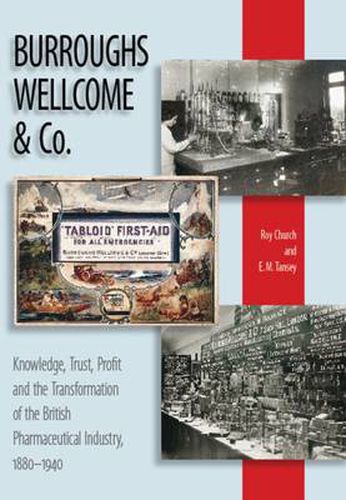Burroughs Wellcome and Company: Knowledge, Trust, Profit and the Transformation of the British Pharmaceutical Industry, 1880-1940
Roy Church,E. M. Tansey

Burroughs Wellcome and Company: Knowledge, Trust, Profit and the Transformation of the British Pharmaceutical Industry, 1880-1940
Roy Church,E. M. Tansey
Over the last half century, the pharmaceutical industry has been one of the great success stories of British industry, achieving world leadership through innovation and exports. Yet, when the partnership of two young American pharmacists, Silas Burroughs and Henry Wellcome, was established in London in 1880, the British industry had been lagging well behind its German and American competitors. In the early years, the company traded in imported products, including the highly profitable Kepler malt extract, and compressed medicines marketed under the ‘Tabloid’ trademark. Rarely in modern British history has a medium-sized company exercised such a dominant influence on an individual industry as did Burroughs Wellcome & Co. Within thirty years it became the largest manufacturer of pharmaceuticals in Britain, and the most significant company in this sector before the Second World War. Part of its commercial success was based upon its deployment of innovative marketing methods, especially product development, branding, advertising, salesmanship, market research, and resale price maintenance (of which Burroughs Wellcome was a pioneer as early as the 1880s).Perhaps more importantly, the pre-eminence and influence of the company lay in its extensive promotion of scientific research. Through a series of research laboratories established by the company in the 1890s - unprecedented in the industry - remarkable scientific advances were made which won the company unique prestige and established an unrivalled reputation and level of trust, especially among the medical community which used and recommended its products. Of particular note was the success of Henry Wellcome in achieving registration for the laboratories under the Cruelty to Animals Act, which allowed staff to perform animal experiments from the beginning of the twentieth century onwards. This was the single most important factor in promoting innovative physiological and bacteriological research within the company and was to serve, to a great extent, as the pattern for all future pharmaceutical research in Britain.In areas such as linking scientific research with manufacturing, Burroughs Wellcome led the way; ultimately, though, the company lost many of its managers, scientists, and engineers, who were enthusiastically recruited by other companies and by the newly created Medical Research Committee (later Council), to create further new laboratories and institutes.There was always significant tension between marketing for commercial profit on the one hand, and the advancement of medical research on the other. After the First World War, amid increasing competition from other British pharmaceutical companies, the profitability of Burroughs Wellcome & Co. as a commercial organisation began to decline, yet its research laboratories continued to lead the way in several important areas. This tension between marketing and research intensified as the company’s relative position in the industry diminished. Before 1914, the strong relationship of trust between the firm and its consumers and clients was a central factor the company’s success.Thereafter, the erosion of trust between managers and scientists who were pursuing sometimes conflicting priorities - and between managers in overseas subsidiary companies and London - is central to understanding the company’s difficulties from the 1920s onwards, and demonstrates what was a continuing problem in the pharmaceutical industry. Professor Church and Dr Tansey examine the history of one of the most significant, innovative and interesting commercial organisations.They provide much new information and insight into many different aspects of this important story: the motivations of the company’s American founders and their fraught relationship, and their activities after they had set up their business in London, at the hub of the British Empire; the company’s innovative marketing and sales techniques; the establishment of pioneering research facilities, the creation of trust in the company’s products and the research behind their development, and later the Wellcome Trust to promote medical and scientific excellence for the benefit of humankind; the creation of one of the earliest multinational companies; and the relationship between commercial operations and pure research.
This item is not currently in-stock. It can be ordered online and is expected to ship in approx 4 weeks
Our stock data is updated periodically, and availability may change throughout the day for in-demand items. Please call the relevant shop for the most current stock information. Prices are subject to change without notice.
Sign in or become a Readings Member to add this title to a wishlist.


